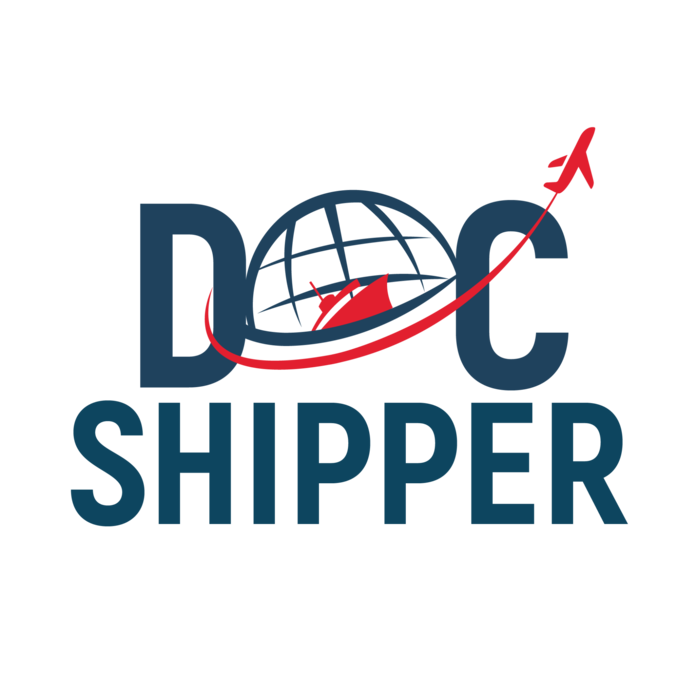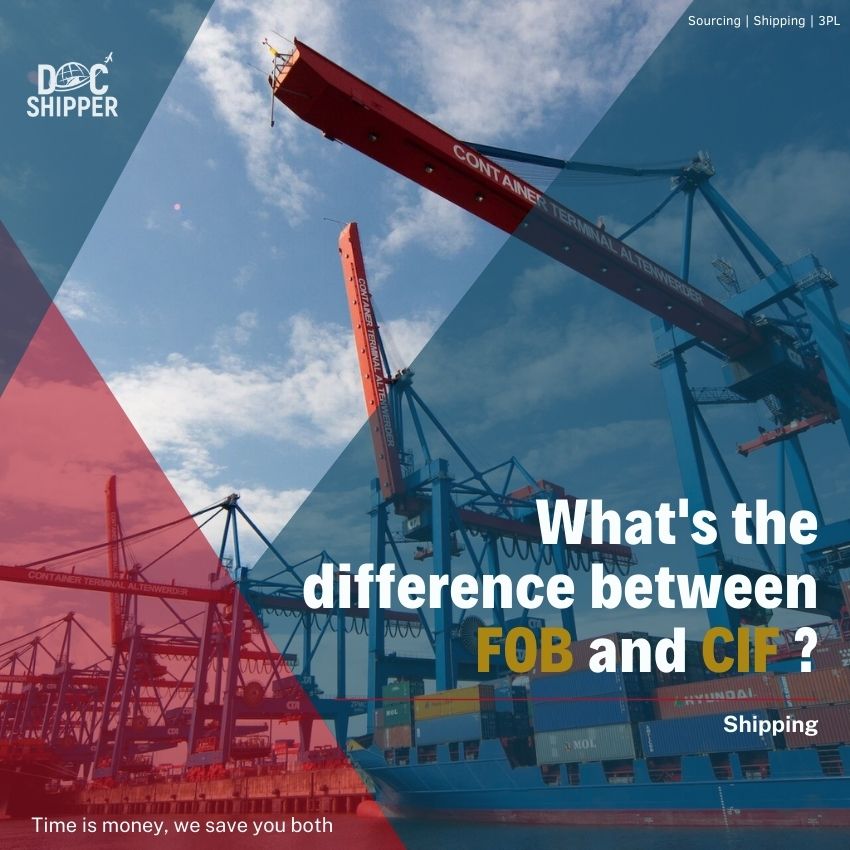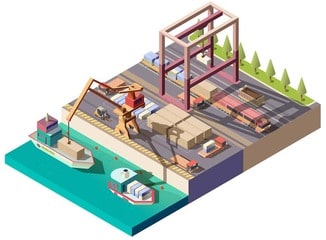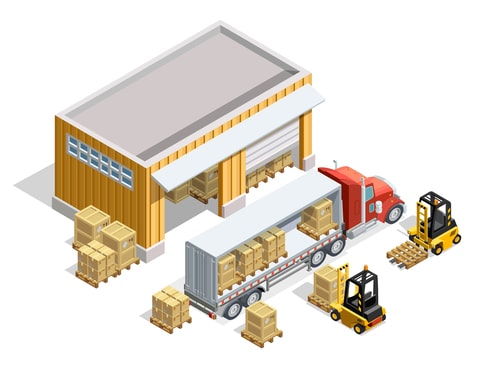In today's globalized economy, international trade has become an essential aspect of business for many companies.
However, the complex procedures, regulations, and terms involved in international trade can make it challenging for businesses to navigate the process.
As international trade involves complex procedures and regulations, understanding the difference between FOB and CIF is crucial for businesses.
FOB and CIF are important trade terms used in international shipping that determine the obligations, risks, and costs between the seller and buyer during the transportation of goods.
This article aims to explain the difference between FOB and CIF, making it easier for businesses to make informed decisions when transporting goods internationally.
Table of Contents
ToggleWhat does the incoterm Free on Board (FOB) mean?
FOB stands for “Free on Board,” and it is a trade term used in international shipping to determine the obligations, risks, and costs associated with the transportation of goods. FOB means that the seller is responsible for delivering the goods to the shipping port and loading them onto the vessel. Once the goods are on board, the risk, and responsibility are transferred to the buyer. FOB does not include the cost of shipping, insurance, or any other fees associated with the transportation of goods beyond the shipping port.
Obligations
Under FOB, the seller is responsible for loading the goods onto the shipping vessel and completing all export customs formalities. They are also responsible for obtaining all necessary permits and licenses and ensuring that the goods comply with all relevant regulations and standards.
Risks
The risk of loss or damage to the goods transfers from the seller to the buyer once the goods are loaded onto the shipping vessel. This means that if the goods are lost or damaged during transit, the buyer bears the risk and must file any claims with their insurance provider.
Costs
Under FOB, the seller is responsible for all costs associated with loading the goods onto the shipping vessel, including handling fees, stevedoring charges, and terminal costs. The buyer is responsible for all costs associated with transporting the goods from the port of origin to their final destination, including freight charges, insurance, and import customs formalities.
What does the incoterm Cost, Insurance and Freight (CIF) mean?
CIF stands for “Cost, Insurance, and Freight,” and it is another trade term used in international shipping. CIF means that the seller is responsible for delivering the goods to the shipping port and loading them onto the vessel, as well as paying for the cost of shipping and insurance. The risk and responsibility are transferred to the buyer once the goods are on board. CIF includes the cost of shipping, insurance, and other fees associated with the transportation of goods beyond the shipping port.
Obligation
The seller is obliged to provide insurance covering the risk of loss or damage to the goods during transport to the port of destination. In addition, the seller is responsible for organizing and paying for the transport of the goods to the port of destination. However, once the goods have arrived at the port of destination, the buyer is responsible for all costs and risks associated with the goods.
Risk
Under CIF terms, the risk of loss or damage to the goods passes from the seller to the buyer once the goods have been loaded onto the vessel. This means that if the goods are lost or damaged during sea transport, the buyer assumes the risk and responsibility.
Cost
CIF terms include the cost of the goods, insurance, and freight to transport the goods from the port of origin to the port of destination. This means that the seller is responsible for paying these costs until the goods arrive at the port of destination. However, it is important to note that CIF terms do not cover additional costs such as customs duties, taxes, and other fees that may be charged on arrival.
Avoid the stress and complications of customs documentation with DocShipper
Want to avoid the stress and complications of customs documentation? We have the solution for you: DocShipper.
DocShipper will take care of your customs formalities, allowing you to concentrate on what's important: your business.
From filling out commercial invoices and packing lists to managing import and export licences and certificates of origin, we take care of all the paperwork. With our innovative online platform, you can track your shipments in real-time and access all relevant documents at your convenience.
So join the community of satisfied DocShipper customers. Contact us for a free shipping quote in 24h.
What are the main differences between FOB and CIF?
When it comes to international trade, choosing the right Incoterm can make a significant impact on the success of a business. Understanding the main differences between FOB and CIF is essential for businesses to make decisions and avoid potential risks and misunderstandings in their international trade transactions.
Cost differences
The primary difference between FOB and CIF is the cost. With FOB, the buyer is responsible for paying the cost of shipping, insurance, and other fees beyond the shipping port. With CIF, the seller includes the cost of shipping, insurance, and other fees beyond the shipping port in the sale price.
Responsibility and risk transfer differences
Another significant difference between FOB and CIF is when the responsibility and risk transfer from the seller to the buyer. With FOB, the transfer occurs once the goods are loaded onto the vessel at the shipping port. With CIF, the transfer occurs once the goods are on board and in transit beyond the shipping port.
Here are some examples of situations where one Incoterm may be more suitable than the other :
If a buyer wants to have more control over the shipment and be able to choose their own freight forwarder and shipping method, FOB may be a better option.
On the other hand, if a buyer is less experienced in international shipping and wants the seller to take on more responsibility and risk, CIF may be a better option.
If the goods being shipped are high-value or delicate, FOB may be preferable, as it allows for more control over the handling and transportation of the goods.
If the seller wants to minimize their responsibility and risk in the shipment of goods, CIF may be a better option as the buyer takes on more responsibility and risk.
Of course, the specific circumstances of each transaction will vary, and it's important for businesses to carefully consider their options and consult with experts, such as those at DocShipper, to determine the best Incoterm for their needs.
Simplify your international shipping process with DocShipper
Looking to simplify your international shipping process? Look no further than DocShipper. With comprehensive services including customs clearance, freight forwarding, warehousing, and packaging, we ensure that your shipments are handled with the utmost care and attention to detail. Plus, our transparent pricing and personalized approach guarantee the best value for your investment. Contact us today to learn how DocShipper can help your business succeed on the global stage.
Why is it important to understand the difference?
These terms help ensure compliance with international trade regulations and can simplify the shipment of goods. By making informed decisions when transporting goods internationally, businesses can reduce risks, save costs, and ensure successful deliveries.
It's important to note that FOB and CIF trade terms can vary depending on the specific agreement between the buyer and seller, and it's essential to have a clear understanding of the terms outlined in the contract to avoid any misunderstandings or disputes.
At DocShipper, we have a team of experts who can help you navigate the complexities of international trade, including FOB and CIF trade terms, to ensure that your goods are transported safely and efficiently by sea freight.
Guaranteed on-time delivery of your goods with DocShipper
At DocShipper, we understand that the timely delivery of your goods is crucial to the success of your business. With our extensive global network of carriers and logistics partners, we have the resources and expertise to ensure that your shipments are delivered on time, every time. Our dedicated team of professionals monitors every step of the shipping process to proactively identify and address any potential delays or issues.
Trust DocShipper for reliable and timely delivery of your goods.
Contact us today to learn more.
FAQ | What’s the difference between FOB and CIF?
Which is better, FOB or CIF?
The choice between FOB and CIF depends on the needs and preferences of the buyer and seller. FOB is often preferred by buyers because it gives them more control over the shipping process and allows them to choose their own shipping company. CIF may be preferred by sellers because it simplifies the shipping process and allows them to take on more responsibility for the shipment. To have your own estimate, I advise you to calculate for free on our site the costs and delays of your international operations
How do the delivery times for FOB and CIF differ in international shipping?
The delivery times for FOB and CIF can differ in international shipping, but it depends on various factors, including the origin and destination of the goods, the mode of transportation, and the customs clearance process. At DocShipper, we offer tailored shipping solutions for both FOB and CIF trade terms, and we work closely with our clients to provide timely updates and optimize shipping routes to minimize transit times.
What are the tax consequences of the FOB and CIF Incoterms for exporting and importing companies?
In general, for FOB Incoterms, the seller is responsible for transportation costs to the port of shipment, while the buyer is responsible for transportation costs from that port, as well as import duties and other applicable taxes.
For CIF Incoterms, the seller is responsible for transportation costs to the port of destination, as well as export duties and other applicable taxes, while the buyer is responsible for transportation costs from that port, as well as import duties and other applicable taxes.
To navigate the complex tax implications of international trade, our team of experienced consultants can provide advice on tax and customs issues and help businesses make informed decisions that minimize their tax liabilities while maximizing their profits.
How can DocShipper help companies choose the right Incoterm for their international shipping needs?
DocShipper can help companies choose the right Incoterm for their international shipping needs by offering expert advice on the different options available and by taking into account the specific requirements of each company, such as costs, delivery times and associated risks.
In addition, DocShipper offers international logistics services for FOB and CIF Incoterms, such as ocean freight, customs clearance, insurance, warehousing, and door-to-door delivery, providing companies with a turnkey service for their international shipping needs. Contact us today to learn more about how we can help you navigate the complexities of international trade and achieve success in the global marketplace.
DocShipper info: Do you like our article today? For your business interest, you may like the following useful articles :
DocShipper US | Procurement - Quality control - Logistics
Alibaba, Dhgate, made-in-china... Many know of websites to get supplies in Asia, but how many have come across a scam ?! It is very risky to pay an Asian supplier halfway around the world based only on promises! DocShipper offers you complete procurement services integrating logistics needs: purchasing, quality control, customization, licensing, transport...
Communication is important, which is why we strive to discuss in the most suitable way for you!








